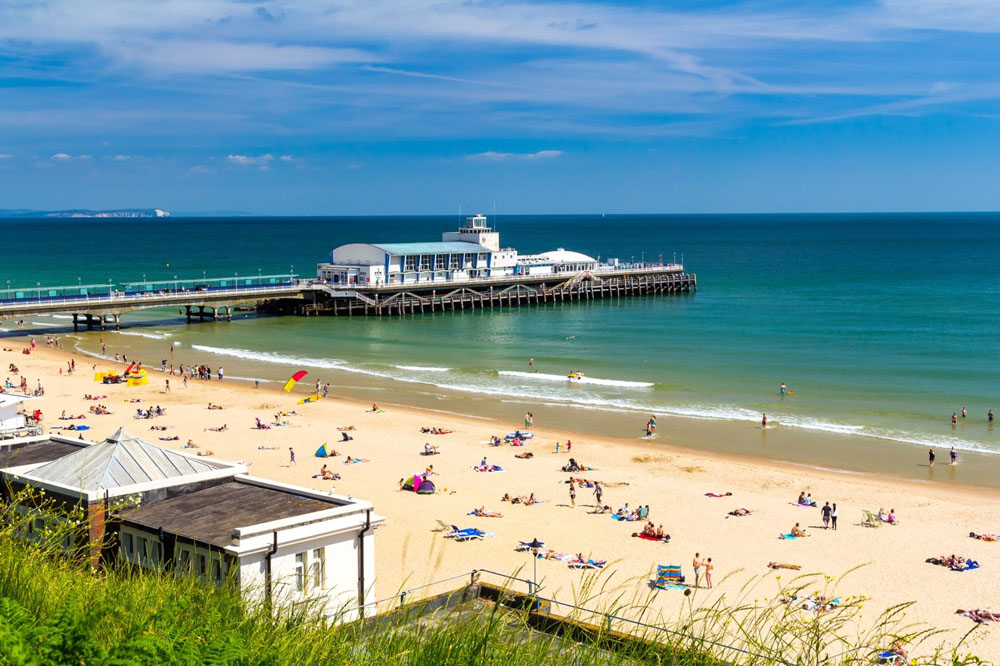Language study trip to England for students

English is required in more and more professions these days and is already indispensable in many industries. This is another reason why we learn English at school. Some learn it as early as 3rd grade, others at the latest in 1st secondary school. English enables us to communicate in many parts of the world. It is an official language in over 50 countries and is spoken by up to 1 billion people worldwide. Speaking English well is therefore an extremely useful skill that needs to be strengthened. And the best way to do this is to go on a language study trip to England or another English-speaking country.
Why is a language study trip to England particularly interesting for students?
The best way to learn a language is to use it, i.e. to speak and listen to it. Of course, this is most likely to be possible where it is spoken by the majority of people. England is therefore the perfect place to improve your English skills and have a unique time at the same time. After all, a language trip is not just about learning vocabulary, practising grammar and writing pages and pages of text. It's about immersing yourself in the language, living in and with it and making it a part of you. And that is precisely the aim of a language study trip to England.
The best time of your life
As a student, you're sure to have one of the best times of your life during your language vacation in England, one that you won't soon forget. Not only will you study together with other young people from all over the world, but you will also spend your free time with them, go on excursions, try out new hobbies, go shopping together, lie on the beach, learn to windsurf, marvel at Stonehenge and visit castles.


Find friends for life
And while you go on a Jack the Ripper tour through London or take a boat trip on the Cam in Cambridge during your language study trip in England, you listen to the guides' stories, laugh at the comments of the other language students and forget that everything you are hearing is not actually being spoken in your native language. Day by day you will understand more and more, until at some point it is completely normal for you to hear and speak English. With your teachers, sales clerks and your new friends from all over the world. And it's not uncommon for friendships to develop from these very acquaintances that last a lifetime and open up an incredible number of opportunities for the future.
A language study trip to England for students: A week? A year? Or everything in between?
The value of being fluent in a second language is particularly impressive in professional life. People who speak English as their mother tongue have better prospects of finding interesting jobs than those who have difficulty communicating. Since not everyone is born bilingual, young people and adults must work independently to acquire these language skills. A language study trip to England can be the first step in this direction. And it can last a week. But it can also last a whole school year.
The ideal age for a year abroad for young people is between 16 and 17, but it can also make sense at a different age. Whether as a 10th school year, a high school year or preparation for the A-levels, a year abroad is an immensely enriching experience for students from which they will benefit for the rest of their lives.
But not every student wants to spend a whole year away from home. Not all parents can afford a year abroad in England. For this reason, a variety of language programs are offered, especially during the vacation periods, which can be booked for a week or more. However, this is not recommended. One week is clearly too short for a language study trip to England. Two weeks should be the absolute minimum, three to four weeks are recommended. This allows young people to get used to their new surroundings, have time to settle in, make new contacts and learn English effectively. And that takes a few weeks.
London Calling
When you think of England, the Queen, the red double-decker buses and Big Ben usually come to mind first. London. And although London is indeed the third largest city in Europe and is simply impressive, varied, beautiful and definitely worth a visit, it is by no means the only city that is worth considering for a language study trip to England.
The cities of Brighton, Eastbourne, Oxford, Bournemouth, Exeter, Liverpool, Cambridge and Manchester are particularly suitable for language trips for students. Excellent language schools and a varied leisure program can be found in each of these cities, all of which have their own individual character. Whether in an idyllic seaside resort or a university city, there is a suitable language school for every language student in England.
To make it easier for you to choose and to give you an impression of the special features of each location, we at Ausbildung-Weiterbildung.ch have put together extensivePortraits of the most popular destinationsfor language study trips to England.
Pay attention to age
Some language schools in England allow children from the age of 8 to take part in a language course, others have a minimum age of 14, others offer language courses for 16 to 18-year-olds and other language schools offer language courses for 10-17-year-olds. It therefore makes sense to pay a little attention to this issue. It will be obvious to everyone that 8-year-olds and 18-year-olds do not necessarily share the same interests and that the choice of subjects is likely to be rather limited. It is therefore important that students can be together with their peers during their language study trip to England and that the classes are correspondingly homogeneous.
As each language school has its own age range, it is worth asking the language travel providers which schools are suitable. And, of course, pay attention to your own needs and those of your child. After all, it may not be an appealing prospect for one 17-year-old to have to spend her free time with 12-year-olds, while another 13-year-old would rather be with younger students than older ones.

What about supervision?
It is particularly important for younger students that they are adequately supervised during their language study trip to England. This does not mean that they should or need to be "supervised" around the clock, but that care is taken to ensure that they are not left to their own devices after their English lessons. This is particularly true for children up to the age of 12, who should not spend their afternoons unsupervised, especially in large cities and by the sea. This factor should therefore be taken into account when choosing the right language school and language travel provider.
It is particularly important for parents to find out how far the host families are from the language school and how the children will get from one place to another. Do they have to make their own way to school? Maybe even by bus or train? Can they walk? Or will they even be accompanied? All these questions should be clarified in advance so that the children can enjoy their language study trip to England safely and without fear.
Alternatively, and particularly suitable for younger students, are colleges where students not only study in a school building, but also live there. These school buildings are often somewhat remote and offer large gardens or parks for the leisure program. The children spend their time in a protected environment with their peers, learning, playing and going on excursions together under the guidance of trained leaders, often also called teamers, who take care of all their concerns and are also available to them as a confidant.



Language study trip England: Accommodation with a host family?
For younger children, parents should carefully consider where they want to place their children. The same applies to teenage students up to the age of 18. It is often possible for them to live in colleges during their language study trip to England, but this option does not exclusively offer advantages for this age group. It is often noticeable that outside of language lessons, young people tend to socialize with people of the same age who speak the same language in order to communicate better in their free time. For Swiss students, this means that they will probably mainly have contact with other Swiss, Germans, Austrians, Luxembourgers and Belgians and will only speak English very occasionally or only later in their free time during their language stay. This is certainly a very attractive prospect for all young people, as it offers variety, entertainment and fun at all times. From a language learning perspective, however, host families are preferable, as you are required to communicate in English on a daily basis outside of lessons and can therefore make progress more quickly.
What about residences?
Many language schools also offer residences or studios where students can live during their language study trip in England. Usually between two and four students sleep in one room and share a common room and bathroom with the other students on the same floor. Single rooms and rooms with private bathrooms can also be booked at some schools. Meals are usually served in the canteen, which is located in or very close to the building.
In a school residence, you make friends quickly, have contact with young people from all over the world and are not far from school. However, as with colleges, living with a host family is much more conducive to language acquisition, but is probably less fun, especially for older young people. In school residences, you will always have a contact person, but you are basically independent and responsible for yourself. You can leave the building whenever and wherever you want (until closing time), which makes this type of accommodation particularly attractive for older young people during their language study trip to England. This unsupervised option is less recommended for younger students.
And in your free time ...
No matter where you stay as a student during your language study trip, the leisure program is always organized by the respective language school and is usually diverse and varied. A day trip to London is part of the standard program almost everywhere, but half-day excursions to the surrounding area, water sports activities such as surfing, kayaking or sailing, sports activities such as rugby, volleyball or golf, beach parties, quiz nights, games and lots of events and other activities are also part of the leisure program, depending on the school and location. Most of the activities are included in the price, others can be booked in addition. Before a language study trip to England, you should therefore ask which additional excursions and activities can be booked locally and how much they will cost so that you have the necessary change.

Some schools also offer the option of a combined language course and a sport, such as football, tennis or sailing. Language students attend English lessons in the morning and take part in a sports course in the afternoon. The language schools are happy to provide information about these combined offers for a language study trip to England.
